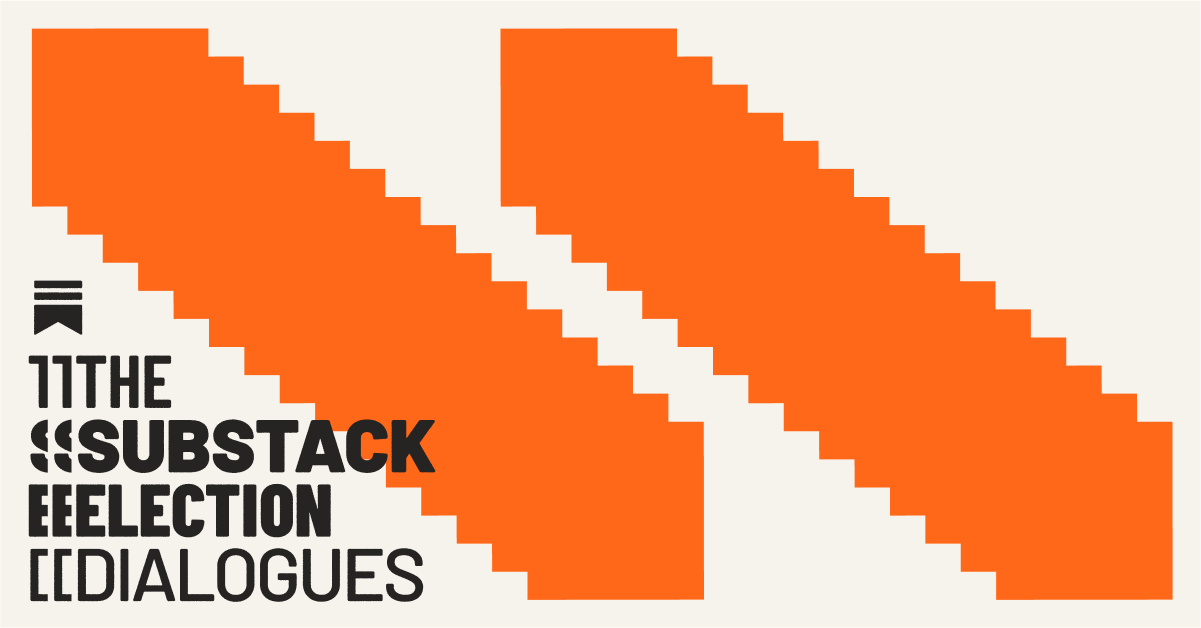A Better Digital PolisAnnouncing the Substack Election Dialogues, featuring Nate Silver, Matthew Yglesias, Joyce Vance, Matt Taibbi, and moreIn the coming weeks, tune in to the Substack app to watch live dialogues featuring Nate Silver, Matthew Yglesias, Jessica Reed Kraus, Matt Taibbi, Tulsi Gabbard, Mehdi Hasan, Dana Loesch, Michael Moore, Robert B. Hubbell, Dan Pfeiffer, Joyce Vance, Sarah Longwell, Chris Cillizza, Judd Legum, Jay Kuo, Sarah Haider, Bill Bishop, Josh Barro, Chris Hedges, Alex Berenson, Michael Moynihan, Kmele Foster, Josh Szeps, Ben Domenech, Steve Schmidt, and many more.When I feel like withdrawing from the media coverage of a long, arduous, unedifying election journey, I try to remember the origin of the word idiot. An idiotes (literally, a private individual) in Athens was someone who was solely preoccupied with his own affairs and showed apathy toward politics; toward, that is, the matters that concerned the whole polis, the city. To be an idiotes was a designation even more derogatory than “idiot” is today, for it meant one failed to fulfill their duty as a citizen. In his famous funeral oration, Pericles praised the people of Athens and their revolutionary institution of democracy for being “unique in the way we regard anyone who takes no part in public affairs: we do not call that a quiet life, we call it a useless life.” Pericles, of course, was never subjected to the kind of political commentary we are witnessing today, especially on social media. Had he caught himself wasting his hours away ensnared in X or Facebook spats with his opponents, perhaps he would have been forced to rethink the above statement. Oration is a powerful and indeed commendable method to wield influence over the masses, and it is theatrical by nature. But our current communication systems, which have profited from the elimination of words, courtesy, and attention, have removed all artistry from it, and reduced its performative quality to that of a chicken fight. Over time, gifted and eloquent political thinkers adopted the personalities of shallow grifters to gain popularity on mediums that promoted provocative, unsubstantiated statements and rewarded acrimony. Choosing to disengage from that type of discourse is simply a form of protest against the debasement of our own politics. Substack, which is built on the direct relationships between publishers and their subscribers, has been an antidote to that. Idiots can be found everywhere, but the word we hear users of the platform celebrate most often is “community,” whose root is communis—“what is shared.” Community implies active participation and unity in the way that Athenians understood citizenship and its functions. Substack’s model has created the space and the freedom necessary for thought to develop, and aligned incentives to invite discourse that can challenge and advance ideas more harmoniously. It is no surprise that as the platform grew it became a refuge for the most important voices in politics today, and those audiences who understood their own agency as thinkers and wished to exercise it. This is why, in the lead-up to the election, we have invited the top publishers in politics to engage with each other in conversation in a series we are calling The Election Dialogues, which will stream exclusively on the Substack app. Participants were asked to select topics for discussion that they find intellectually challenging, and to focus on issues that are yet unresolved in their minds as they approach the ballots. They may have simpatico views with their interlocutors on the whole, but on these issues, their opinions may differ in a nuanced enough way to create the right conditions for advancing their own thinking. Substack is and will forever be a home for writers, so everyone reading this must already know that we share in the belief that words matter. We are using “dialogue” advisedly. It is a word that hints at curiosity and receptivity to being influenced by another in the pursuit of truth. It differs distinctly from “debate,” which is the etymological mix of “apart” and “fight.” Interestingly, Athenians did not have a unique word in their vocabulary for that. In the coming weeks, you can tune in to watch live dialogues featuring Nate Silver, Matthew Yglesias, Jessica Reed Kraus, Matt Taibbi, Tulsi Gabbard, Mehdi Hasan, Dana Loesch, Michael Moore, Robert B. Hubbell, Dan Pfeiffer, Joyce Vance, Sarah Longwell, Chris Cillizza, Judd Legum, Jay Kuo, Sarah Haider, Bill Bishop, Josh Barro, Chris Hedges, Alex Berenson, Michael C. Moynihan, Kmele, Josh Szeps, Ben Domenech, Steve Schmidt, and many more. Subscribe to the publishers participating and follow this space for updates on the schedule and to learn more. We hope that no matter where you stand politically, you will join us—not just as spectators, but also as curious citizens who are building a better digital polis alongside us, one that has no real use for those who choose to act like idiots. |
Search thousands of free JavaScript snippets that you can quickly copy and paste into your web pages. Get free JavaScript tutorials, references, code, menus, calendars, popup windows, games, and much more.
A Better Digital Polis
Subscribe to:
Post Comments (Atom)
When Bad People Make Good Art
I offer six guidelines on cancel culture ͏ ͏ ͏ ͏ ͏ ͏ ͏ ͏ ͏ ͏ ͏ ͏ ͏ ͏ ͏...
-
code.gs // 1. Enter sheet name where data is to be written below var SHEET_NAME = "Sheet1" ; // 2. Run > setup // // 3....




No comments:
Post a Comment